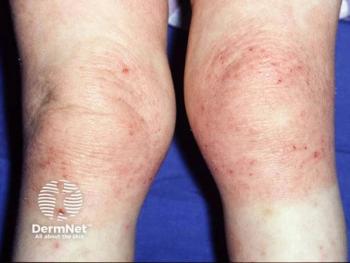
- Dermatology Times, November 2018 (Vol. 39, No. 11)
- Volume 39
- Issue 11
Dupilumab may be for adolescents too, EADV report shows
A study presented at EADV in Paris today showed that dupilumab met its primary endpoints in a phase three study of adolescents with moderate-to-severe atopic dermatitis.
PARISâA study presented today at the European Academy of Dermatology and Venereology (EADV) Congress in Paris, showed that dupilumab met its primary endpoints in a phase three study that focused on its use as a treatment for adolescents with moderate-to-severe atopic dermatitis.
“Dupilumab treatment showed clinically meaningful and statistically significant improvements in atopic dermatitis signs and symptoms and quality of life in adolescents” said Eric Simpson, M.D., of Oregon Health and Science University, Portland, Ore., and the study’s principal investigator.
Atopic dermatitis in adolescence has an estimated prevalence of 8.6% in the U.S. and 5-15% in Europe. Adolescent atopic dermatitis affects mood, sleep and behavior, and the chronic relapsing nature of the condition severely affects quality of life. At present, there are limited treatment options for adolescents that have a good efficacy-safety ratio.
Dupilumab is a human monoclonal antibody against interleukin-4 receptor alpha, which inhibits the signaling of type 2 cytokines that are important drivers of AD (interleukin-4 and interleukin-13). Dr Simpson’s work follows on from previous work of Dr. Simpson and his research team in adults with atopic dermatitis in which dupilumab was shown to be safe and effective.
This randomized, placebo-controlled, double-blind, parallel-group study recruited 251 adolescents aged 12 to 17 years old (mean age: 14 years) with moderate-to-severe atopic dermatitis that was inadequately controlled by topical therapies. After a washout period, subjects were randomly allocated to a dupilumab Q4W treatment group (300 mg; n = 84), dupilumab Q2W treatment group (200 mg or 300 mg; n = 82), or a placebo group (n = 85). Endpoints were measured at baseline and at week 16.
The population had more severe atopic dermatitis than that of the previous study with adults, with higher mean Eczema Area and Severity Index (EASI) scores, a larger proportion exhibiting severe atopic dermatitis, and high allergic comorbidity (92%). The mean disease duration was 12 years.
Both dupilumab groups showed a significantly higher proportion of patients with IGA scores of 0 or 1 (clear or almost clear) than the placebo group at week 16, with slightly stronger responses seen in the Q2W group (Q4W group: 17.9%; Q2W group: 24.4%; placebo group: 2.4%). The proportion of patients reaching EASI-75 at week 16 was 38.1% in the Q4W group, 41.5% in the Q2W group, and 8.2% in the placebo group. All results were significant at p < 0.001.
“The effect sizes seen in the change in EASI scores from baseline were larger than those seen in the previous adult trial,” Dr Simpson said. Dupilumab treatment also enhanced quality of life as compared to placebo, as measured by the Children's Dermatology Life Quality Index and the Patient Oriented Eczema Measure score.
Rates of conjunctivitis and injection-site reactions were higher in the dupilumab groups, but atopic dermatitis exacerbation and non-herpetic skin infections were higher in the placebo group. There was one serious adverse event in the placebo group (appendicitis).
“For most categorical endpoints, the Q2W regimen was numerically superior to the Q4W regimen,” Dr. Simpson said. “Both placebo-corrected efficacy and safety of dupilumab in adolescents were similar to those observed in adults.”
REFERENCE
Simpson, E. (2018). Dupilumab Efficacy and Safety in Adolescents with Moderate-to-Severe Atopic Dermatitis: Results from a Multicenter, Randomized, Placebo-Controlled, Double-Blind, Parallel-Group, Phase 3 Study, The 27th European Academy of Dermatology and Venereology Congress, Paris, France, 15th September, 10:45 - 11:00 AM
Articles in this issue
about 7 years ago
Low-dose bleomycin injections result in curious side effectabout 7 years ago
7 Safety recommendations for tattoo removalabout 7 years ago
Being older helps skin heal with less scarringabout 7 years ago
A guide to wound careabout 7 years ago
Topical sirolimus shows positive results in two studiesabout 7 years ago
Wound healing in psoriasis, multiple sclerosisabout 7 years ago
Classifying diabetic foot ulcersabout 7 years ago
Role of protease targets in wound healing uncertainabout 7 years ago
Allograft Tissue Research Grant program taking applicantsabout 7 years ago
Verrica develops a solution for common wartsNewsletter
Like what you’re reading? Subscribe to Dermatology Times for weekly updates on therapies, innovations, and real-world practice tips.











